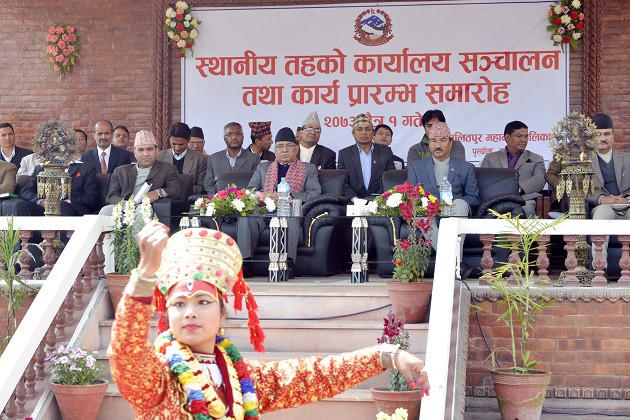Make way for inevitable local elections (Commentary)
 Manoj Karki / Kathmandu: News reports and social media are abuzz with discussions over the names of the candidates likely to be fray in the May 14 local election to various posts including mayor and deputy mayors of municipalities.
Manoj Karki / Kathmandu: News reports and social media are abuzz with discussions over the names of the candidates likely to be fray in the May 14 local election to various posts including mayor and deputy mayors of municipalities.
Some of the names have come from well-wishers and supporters while some have been put in by the leaders themselves to stake a claim on behalf of their respective parties. Though it is yet to be seen if they bear any fruit, it has in a way generated an atmosphere conducive to the elections.
There is also a kind of euphoria over the elections at the now defunct district level, with local-level leaders already working to win their parties’ faith for the official candidacy on behalf of their respective political party. Leaders are known to have started running around political party leaders and using their support base to generate pressure for their candidacy. The competition is likely to be on the major posts like the Chair, Vice-chair of the rural municipalities and the Mayor and deputy Mayor of Municipalities.
It will be for the first time that the next local elections will see a surge in the number of women being elected as people’s representatives. The new election regulations guarantee a minimum of forty per cent of women representation. Also certain is the representation of the Dalit community and the minorities.
Hence, women leaders, Dalits and minorities are enthusiastic over the abundant possibilities that now lie before them to be at the helm of local governance affairs. Local party leadership are also looking into meeting the requirement that never existed before at the local level. This mandatory provision has now forced the political parties to groom their respective candidates to represent the reserved categories.
In the meantime, eligible voters have started looking into and reconfirming their names in the voters list now accessible online. Social sites are awash with the election commission link to the voters list, which is also helping them to look for errors, if any, in their name and address, among other details.
With the announcement of the local elections, many voters deprived of voting for the past 20 years (at least 4 elections) are looking forward to finally exercising their franchise.
Meanwhile, the Election Commission has said that its preparation at the central level is over and the focus is now at the local level. With almost all election-related laws in place, the EC has also finalized the security strategy for the election and is looking forward to receiving the regulation related to political parties. The bill is likely to be passed into a law by the parliament in the next few days.
However, despite all these positive developments in the lead up to the elections, there lies strong uncertainty over the elections taking place at all. This has thereby developed a feeling of scepticism in the people.
The threat of a boycott by the Madhesh-based parties including the Federal Alliance that they are affiliated with continues to hold as of this hour. Their demands for amendment to the constitution, realignment of the boundaries of the federal units among others are yet to be met. Several rounds of discussion have taken place between the agitating parties and the government, but no solution has been achieved so far.
Furthermore, some political parties are also calling for postponement of the election date.
However, major political parties including the ruling Nepali Congress, CPN-MC and the main opposition CPN-UML are putting forth a rigid stand that the elections will take place no matter what the Madhesh-based parties decide. The tussle continues to lie between the Madhesh-based parties and the UML, both taking rigid positions and blocking any solution with a middle-path approach.
And to add salt to injury as far as the anti-election environment is concerned, the Rastriya Prajatantra Party, now, a ruling ally, has taken to the streets including staging a gherao of the constitutional body—the Election Commission after the latter decided to remove Hindu state and monarchy from the party’s statute. Many leaders were injured in the clash. It is yet to be what would be the next step of the party that is led by a Deputy Prime Minister in the present government.
Many more parties, especially the fringe ones, are likely to take to the streets as well after a decision was taken through a parliamentary sub-committee to impose a threshold for Proportional Representation (PR) seats and at least one seat to be won in First-past-the-post (FPTP) to be recognized as a national party in the new political party law.
Hence, despite all the progress made so far in the lead up to the elections, which is only 52 days away, there is a risk of pushing the country towards another state of political vacuum at the local level. It is again the civil administration that will oversee the local level until elected representatives take over. And with new structures just in place at the local level, leaving it again at the mercy of the bureaucrats would be a big mistake as far as realizing the people’s aspiration for a governance of their own or self-rule through the implementation of the federal structure of governance.
The major players should hence play a positive and coherent role in ensuring that the progress made so far is not lost and that the people’s right to be ruled by their own representatives is realized. No excuse can justify the postponement or rescheduling of the local elections, not at the cost of real democracy for which periodic elections are indispensable. RSS
